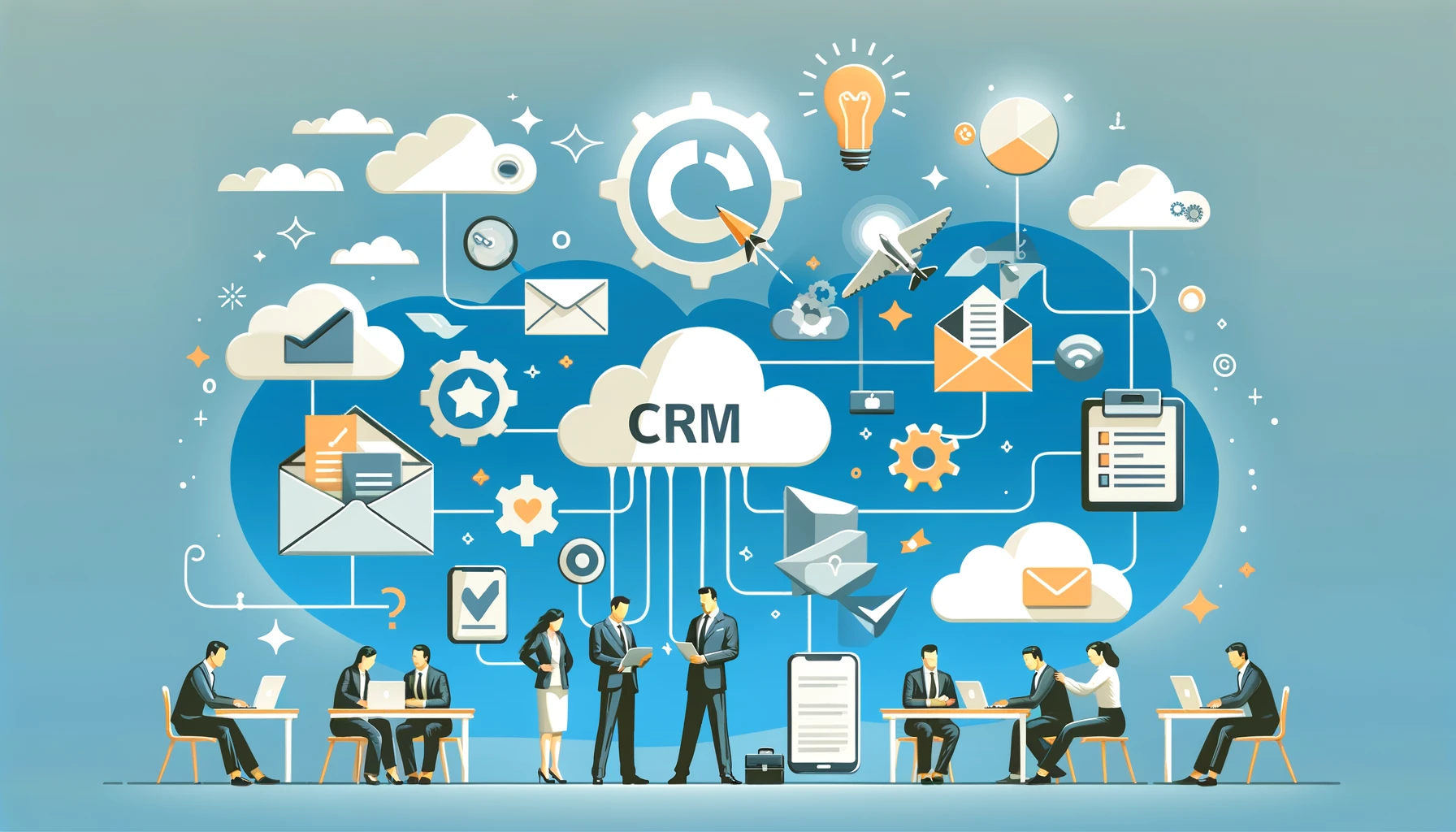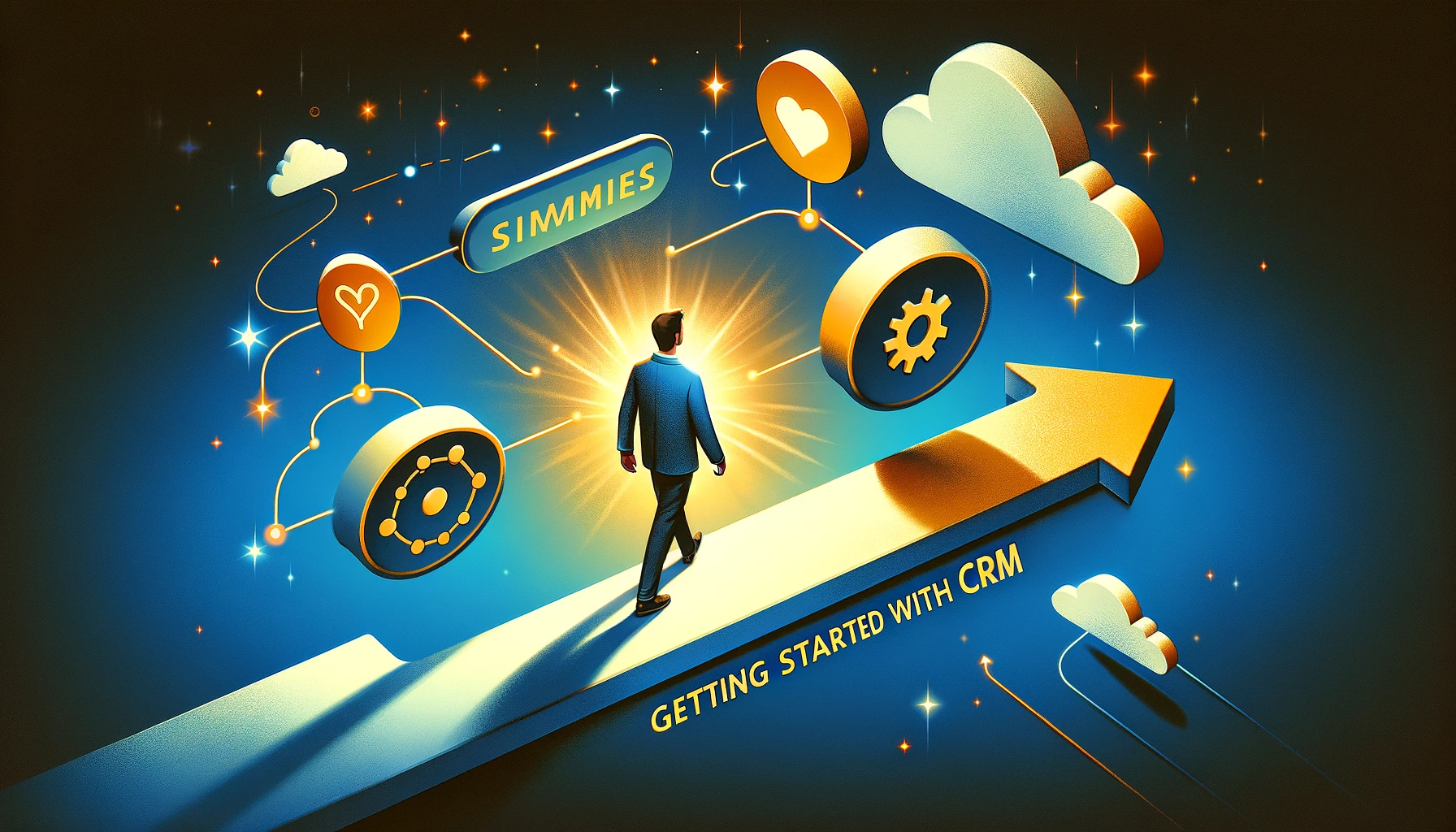What Are CRM Platforms? Unlocking Business in 2024

What are CRM platforms? Learn about the tools that revolutionize customer interaction and support business efficiency and innovation.
Understanding the Basics: What are CRM Platforms
In the digital age, understanding CRM platforms is essential for businesses aiming to streamline their customer management processes. These platforms are powerful tools that facilitate better customer interactions, helping businesses manage and analyze customer interactions and data throughout the customer lifecycle.
CRM, or Customer Relationship Management platforms, are software systems that integrate various functions into one comprehensive platform. They manage and maintain customer relationships, track engagements and sales, and deliver actionable insights. They’re designed to improve customer service relationships and assist in customer retention, driving sales growth.

What makes CRM platforms so crucial? Here are some key reasons:
- Improved Customer Relations: One of the primary benefits is the enhancement of customer relationships. By understanding their needs and behavior, companies can customize their offerings and interactions, leading to increased customer satisfaction and loyalty.
- Increased Efficiency: By automating and streamlining tasks, businesses can increase efficiency and productivity. This includes everything from tracking leads to managing customer feedback.
- Actionable Insights: CRM platforms offer a wealth of data, which can be used to generate insights and make informed business decisions.
Let’s look at an example. Suppose a company was struggling to manage its customer data and interactions. After implementing a CRM platform, the company was able to automate many of its processes, saving time and reducing errors. The platform’s analytics feature also provided insights that helped the company improve its customer service and increase sales.
| Metric | Before Implementation | After Implementation | Improvement |
|---|---|---|---|
| Customer Satisfaction Score (out of 10) | 6 |
8 |
+33.3% |
| Sales Growth (%) | 10 |
25 |
+150% |
| Operational Efficiency (%) | 70 |
90 |
+28.6% |
In conclusion, understanding CRM platforms and their potential benefits can be a game-changer for businesses. They not only improve customer relationships but also increase efficiency, drive growth, and provide valuable insights.
How CRM Platforms Elevate Your Business Success
Elevating business success is no small feat, especially in an era where customer expectations are at an all-time high. So, how can CRM platforms play a pivotal role in this journey? Let’s delve into it.
CRM platforms offer a centralized system for storing all customer-related data. This means every interaction, every transaction, and every service query is documented and made accessible to the relevant teams. Such a system enables businesses to provide personalized experiences to their customers, fostering stronger relationships.

For instance, a sales representative, equipped with a customer�s purchase history and preferences, can upsell or cross-sell products more effectively. Similarly, a customer service agent can resolve issues faster when they have a customer’s complete history at their fingertips.
But the benefits don’t end there:
- Streamlined Internal Communication: CRM platforms break down departmental silos by ensuring everyone has access to the same customer information. This fosters better collaboration and coordination among teams, leading to improved efficiency.
- Enhanced Marketing Efforts: With a clearer understanding of customer behavior and preferences, businesses can design more targeted and effective marketing campaigns. CRM platforms also provide tools to track and measure the success of these campaigns, enabling continuous improvement.
- Increased Sales: By providing a clear view of the sales pipeline, CRM platforms help businesses identify potential opportunities, manage leads more effectively, and close deals faster.
To illustrate, let’s consider a company that recently integrated a CRM platform into their operations. They were able to reduce their order processing time from 24 hours to 8 hours, a 66% improvement. Additionally, the order error rate reduced from 10% to 2%, a significant 80% reduction. This led to an increase in customer satisfaction from 7 to 9, a 28.6% improvement.
| Metric | Before CRM | After CRM | Improvement |
|---|---|---|---|
| Order Processing Time (hours) | 24 |
8 |
-66% |
| Order Error Rate (%) | 10 |
2 |
-80% |
| Customer Satisfaction Score (out of 10) | 7 |
9 |
+28.6% |
So, if you’re looking to improve your business performance, customer satisfaction, and overall growth, it might be time to ask “what are CRM platforms” and explore how they can elevate your business success.
Delving Deeper: The Inner Workings of CRM Platforms
Peeling back the layers of CRM platforms, we find a wealth of features that cater to various business needs. At their core, CRM platforms are databases that store customer information. They house everything from basic contact details to a customer’s buying habits and preferences. This central repository of data is what gives businesses the ability to personalize interactions and improve customer experiences.

Diving deeper, CRM platforms are not just mere databases. They are integrated systems that connect different departments within a business. For instance, the sales team can track leads and sales, the marketing team can manage campaigns and track performance, and the customer service team can handle customer queries and feedback. This cross-functional integration enhances collaboration and efficiency.
Key features of CRM platforms typically include:
- Contact management: This feature allows businesses to store and manage customer information in one place.
- Interaction tracking: Businesses can record every interaction with clients, aiding in future communication and problem-solving.
- Lead management: Businesses can track potential customers, manage follow-ups, and streamline the sales process.
- Analytics and reporting: This feature provides businesses with actionable insights and helps them make data-driven decisions.
Consider a business that was juggling multiple applications to manage different aspects of customer relationships. After switching to a CRM platform, they were able to consolidate all these functions into one system, making their processes more efficient and their data more reliable.

In the end, CRM platforms are more than just tools for managing customer relationships. They’re strategic assets that can transform a business’ operations and drive its success. So, when you ponder “what are CRM platforms”, think of them as the nerve center of your customer-focused efforts. They’re the heart that pumps life into every customer interaction, every decision, and every strategy.
CRM Platforms in Action: Real-World Success Stories
As we delve into real-world examples of CRM platforms in action, we can truly grasp their transformative potential. Let’s explore some success stories that illustrate the power of these platforms.
Consider a mid-sized tech company that was grappling with low customer retention rates. They decided to implement a CRM platform to better understand their customers. The platform’s analytics feature revealed that a high percentage of customers were not renewing their subscriptions due to a lack of personalized engagement. Using this insight, the company was able to tailor their communication, leading to a 40% increase in customer retention.

Meanwhile, a retail business was struggling with sluggish sales growth. Upon integrating a CRM platform, they were able to streamline their sales process, manage leads more effectively, and close deals faster. The result? A whopping 70% increase in sales growth within a year.
In another instance, a healthcare company was facing challenges in managing patient data. With the help of a CRM platform, they were able to centralize all patient data, improving the efficiency of their services. This led to an impressive 50% decrease in patient wait times.
| Metric | Before CRM | After CRM | Improvement |
|---|---|---|---|
| Customer Retention Rate (%) | 60 |
84 |
+40% |
| Sales Growth (%) | 20 |
34 |
+70% |
| Patient Wait Time (minutes) | 30 |
15 |
-50% |
These success stories underscore the transformative power of CRM platforms. They highlight how these platforms can offer a competitive edge in today’s hyper-competitive business landscape. So, when you ask “what are CRM platforms”, think of them as the catalyst that can propel your business to new heights.

Simplifying CRM: How to Get Started with CRM Platforms
Embarking on the CRM journey might seem daunting at first, but it doesn’t have to be. Here’s a simplified process to get started with CRM platforms.
First things first, identify your needs. What are the pain points in your customer management process? What goals do you aim to achieve with a CRM tool? The answers to these questions will guide you in selecting the right platform.
Next, do your research. There’s a plethora of CRM platforms out there, each with its unique features and benefits. Compare these platforms, consider their pricing, and check out their reviews.
Once you’ve selected a platform, it’s time to get your team on board. Training is essential to ensure that everyone understands how to use the platform effectively. Remember, the full potential of CRM platforms can only be realized when they are used correctly and consistently.
After implementation, monitor the platform’s performance. Are you seeing improvements in customer relations, efficiency, and sales growth? If not, it might be time to tweak your strategies or consider a different platform.
Lastly, keep evolving. Customer needs and market dynamics change over time. Regularly review and update your CRM strategies to stay competitive.

Let’s illustrate this with a scenario. A company was facing issues with customer retention. They identified that the problem was a lack of personalized communication. After researching, they chose a CRM platform that offered robust customer segmentation and personalized marketing capabilities. Post-implementation, they saw a significant improvement in customer retention rates.
| Metric | Before CRM | After CRM | Improvement |
|---|---|---|---|
| Customer Retention Rate (%) | 60 |
84 |
+40% |
So, if you’re pondering over “what are CRM platforms” and how to get started, remember that it’s all about understanding your needs, choosing the right platform, training your team, monitoring performance, and continuously evolving.
The Future of Business: How CRM Platforms Make Life Easier
In the fast-paced world of business, the ability to simplify and streamline processes is a game-changer. This is where CRM platforms shine. They offer a comprehensive solution to manage customer relationships, providing a single platform to track, analyze, and improve interactions with customers.
One of the most significant benefits of CRM platforms is the automation of mundane tasks. From following up with potential leads to sending out marketing emails, these tasks can be automated, freeing up time for the team to focus on more critical aspects of the business.
For instance, a company could automate its email marketing campaigns based on customer behavior. If a customer adds an item to their online shopping cart but doesn’t complete the purchase, an automated email could be sent to remind them about their pending purchase. This not only improves efficiency but also enhances the customer experience.

Another way CRM platforms make life easier is through data analysis. With a wealth of customer data at their disposal, businesses can gain valuable insights into customer behavior, preferences, and trends. This information can then be used to inform business decisions, from product development to marketing strategies.
Consider a company that noticed a trend of customers abandoning their shopping carts on their website. Upon analyzing the data, they discovered that most customers left the site when asked to create an account before completing their purchase. Armed with this insight, the company decided to offer a guest checkout option, leading to a significant reduction in cart abandonment rates.
| Metric | Before CRM | After CRM | Improvement |
|---|---|---|---|
| Cart Abandonment Rate (%) | 70 |
30 |
-57% |
CRM platforms can also enhance team collaboration. With a shared platform, all teams have access to the same customer data, enabling them to work together more effectively. This can lead to improved customer service, as all teams have a complete understanding of the customer’s history with the company.

As businesses continue to evolve and customer expectations rise, CRM platforms will play an increasingly crucial role in business success. They simplify processes, provide valuable insights, and foster collaboration, making life easier for businesses and customers alike.
FAQs
-
Is CRM Simply a Database or More? CRM, or Customer Relationship Management, is more than just a database. While it indeed stores customer information like a database, it also integrates sales, marketing, and customer service strategies, providing tools for data management, customer interaction tracking, reporting, analytics, and task automation.
-
How Does CRM Differ From a Traditional Database? A traditional database primarily focuses on storing and retrieving data. CRM, on the other hand, not only stores data but also analyzes it to provide insights, manages customer interactions, and automates various tasks, making it a comprehensive tool for business growth.
-
What are the Key Benefits of Implementing a CRM System in a Business? Implementing a CRM system can lead to improved customer satisfaction, increased efficiency, and enhanced decision-making. It provides a consolidated platform for customer data, enables effective tracking of customer interactions, and helps in strategic planning through data analysis.
-
Can CRM Systems Integrate with Other Business Tools? Yes, CRM systems are designed to integrate seamlessly with other business tools. This integration helps in maintaining data flow between different systems, ensuring a unified approach to data management and customer relationship strategies.
-
How Does CRM Aid in Making Data-Driven Business Decisions? CRM systems analyze customer data to identify trends, preferences, and patterns. This analysis helps businesses in forecasting outcomes, tailoring marketing strategies, and making informed decisions that align with customer needs and business goals.
Read more about low-code platform ozma.io
CRM for Beginners: Easy to Start!
CRM for Photographers: More Clients and Efficiency





